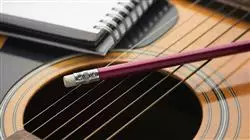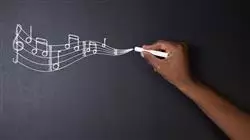University certificate
The world's largest faculty of education”
Description
This Postgraduate diploma in Didactics and Music Teaching generates a sense of security in the performance of your profession, which will help you to grow personally and professionally"

Therefore, the teaching of music should not only be relegated to a matter of content acquisition, but it is necessary to train and specialize the teacher in each and every one of the dimensions involved in musical learning.
This educational action makes professionals in this field increase their ability to succeed, which results in a better practice and performance that will have a direct impact on students, in the improvement of the subject of music and in the general benefit for the whole society.
Because it offers a comprehensive vision of musical learning in all its dimensions, providing tools, experiences and advances in this field, which have also been guaranteed by the teachers of the educational action. Thus, the student will learn based on professional experience and pedagogy, making the student’s training more efficient and precise.
In addition, it is necessary to highlight that, although there is training on music didactics, there is no program that offers a multidimensional approach to musical learning, studying not only elements related to the content, but also giving importance to the figure of the learner, to their educational, personal, social and intellectual characteristics and needs.
The different modules are taught in sessions, following an eminently practical approach, with the necessary theoretical support for each. All TECH Postgraduate diploma teachers have extensive experience working with people of all ages and diverse socio-familial and educational contexts. In addition, it should be taken into account that musical learning is approached integrating the educational, personal and social-group vision.
In addition to training students in music didactics and in the educational environment, it will also facilitate their insertion in the labor market, due to the great demand for this type of specialized professionals within the formal educational system, as well as in the non-formal sector (private music schools or musical groups).
For students who are already in the working world, it will allow them to better position themselves professionally and increase their chances of promotion and recognition.
Update your knowledge through the Postgraduate diploma in Didactics and Music Teaching"
This Postgraduate diploma in Didactics and Music Teaching contains the most complete and up-to-date Educational program on the market The most important features of the program include:
- More than 75 practical cases presented by experts in Didactics and Music Teaching. The graphic, schematic, and eminently practical contents with which they are created provide scientific and practical information on the disciplines that are essential for professional practice
- News on detection and intervention in Didactics and Music Teaching
- It contains practical exercises where the self-evaluation process can be carried out to improve learning
- Algorithm-based interactive learning system for decision-making in the situations that are presented to the student
- With special emphasis on evidence-based methodologies in Didactics and Music Teaching
- All of this will be complemented by theoretical lessons, questions to the expert, debate forums on controversial topics, and individual reflection assignments
- Content that is accessible from any fixed or portable device with an Internet connection
This Postgraduate diploma may be the best investment you can make when choosing a refresher program, for two reasons: in addition to updating your knowledge in Didactics and Music Teaching you will obtain a qualification from the largest digital university of the world, TECH
The teaching staff includes professionals in didactics and teaching, who bring their experience to this training program, as well as renowned specialists belonging to leading societies and prestigious universities.
The multimedia content developed with the latest educational technology will provide the professional with situated and contextual learning, i.e., a simulated environment that will provide immersive training program to train in real situations.
This program is designed around Problem Based Learning, whereby the professional must try to solve the different professional practice situations that arise during the course. For this purpose, the psychologist will be assisted by an innovative interactive video system created by renowned and experienced experts in the field of Didactics and Music Teaching with extensive teaching experience.
Increase your decision-making confidence by updating your knowledge with this Postgraduate diploma"

Take the opportunity to learn about the latest advances in Didactics and Music Teaching and improve your students’ training"
Syllabus
The structure of the contents has been designed by a team of professionals from the best education centers and universities in the country, who are aware of the relevance from up-to-date training to be able to intervene in the training and support of students with high capabilities, and are committed to quality teaching through new educational technologies.

This Postgraduate diploma in Didactics and Music Teaching contains the most complete and up-to-date educational program on the market”
Module 1. Training Music Teachers
1.1. Introduction to Teacher Training
1.1.1. Music Education as a Social Fact
1.1.2. Approaches to Teacher Training
1.1.3. Challenges of Higher Music Education
1.2. Vocation as a Fundamental Element of Music Education
1.2.1. Vocation as a Teaching Activity
1.2.2. Fundamental Challenges
1.2.3. Personal Realization
1.3. Didactic Competences
1.3.1. Foundations of Didactics in Music Education
1.3.2. Didactics of Musical Language
1.3.2.1. Voice and Singing
1.3.2.2. Instrumental Practice
1.3.2.3. Dance
1.3.3. Application of ICTs
1.3.4. Research and Didactics
1.3.5. Curricular Guidance
1.3.6. Musical Teaching Models
1.4. The Importance of Mastery in Knowledge Transfer
1.4.1. Teaching-Learning Styles
1.4.2. Content Network Structuring
1.5. Music Teacher Profile
1.5.1. Childhood Stage Teacher
1.5.2. Primary Education Teacher
1.5.3. Secondary Education teacher
1.5.4. Conservatory Teacher
1.5.5. Music Schools. Non-Regulated Training
1.6. Current Currents for Training Teachers
1.6.1. The Educational Value of Music
1.6.2. Specialist Teacher Training
1.6.3. Professional Skills
1.7. The Importance of Quality in the Teacher Training Process
1.7.1. Introduction
1.8. Non-Regulated Training Teacher
1.8.1. Introduction
1.8.2. Differences Between Formal, Non-Formal and Informal Education
1.8.3. Music Schools
1.9. Continuing Education for Music Teachers
1.9.1. Introduction
1.9.2. Modalities of Continuing Education
1.9.2.1. Types of Permanent Education Activities
1.9.2.2. Types of Permanent Education Activities
1.9.2.3. ICTs
1.9.3. Initial and In-Service Training for Music Teachers
1.10. The Importance of Quality in the Teacher Training Process
1.10.1. Quality Criteria in Teacher Training
1.10.2. The Concept of Educational Quality
1.10.3. Quality Standards
1.10.3.1. School Management Standards
1.10.3.2. Professional Performance Standards
1.10.3.3. Professional Teaching Performance Standards
1.10.3.4. Professional Managerial Performance Standards
1.10.4. Quality Creation in Education Centers
Module 2. Music Didactics
2.1. Introduction
2.1.1. Introduction
2.1.2. Music in Ancient Greece
2.1.3. The Greek Ethos
2.1.4. Epic Poetry: Homer
2.1.4.1. The Iliad
2.1.4.2. The Odyssey
2.1.5. From Myth to Logos
2.1.6. Pythagoreanism
2.1.7. Music and Healing
2.2. Main Musical Methodologies
2.2.1. Dalcroze Method
2.2.1.1. Description of the Method
2.2.1.2. Main Features
2.2.2. Kodaly Method
2.2.2.1. Description of the Method
2.2.2.2. Main Features
2.2.3. Willens Method
2.2.3.1. Description of the Method
2.2.3.2. Main Features
2.2.4. Orff Method
2.2.4.1. Description of the Method
2.2.4.2. Main Features
2.2.5. Suzuki Method
2.2.5.1. Description of the Method
2.2.5.2. Main Features
2.3. Music and Body Expression
2.3.1. Music Experience Through Movement
2.3.2. Rhythmic-Bodily Expression
2.3.3. Dance as a Didactic Resource
2.3.4. Relaxation Techniques and their Relation to Musical Learning
2.4. Musical Play as a Learning Activity
2.4.1. What is a Game?
2.4.2. Game Features
2.4.3. Benefits of Playing
2.4.4. The Musical Game
2.4.4.1. Resources for the Musical Game
2.5. Main Differences Between Music Education for Children and Music Education for Adults
2.5.1. Music Education for Children
2.5.2. Music Education for Adults
2.5.3. Comparative Study
2.6. Educational Resources for Music Education for Children: Musicograms and Musical Tales
2.6.1. Musicograms
2.6.2. Musical Stories
2.6.2.1. Producing Texts in Musical Stories
2.6.2.2. Musical Adaptation of Texts
2.7. Educational Resources in Musical Education for Adults
2.7.1. Introduction
2.7.2. Introduction
Module 3. Material Resources for Teaching Music
3.1. Introduction
3.1.1. The Shift from Analog to Digital
3.1.2. Open Educational Resources as a Basis for Equality Among Learners
3.1.3. Education for All and its Relation to New Technologies
3.1.4. Some Educational Models Based on OER
3.1.4.1. Open Learn (United Kingdom)
3.1.4.2. The OpenCourseWare Worldwide Consortium (OCWC)
3.1.4.3. Digital Educational Platforms
3.1.4.4. Open Materials for University Staff Training on E-learning and Learning Object Repositories
3.1.4.5. Open e-learning Content Observatory Services
3.1.5. Materials and Resources for Learning Music
3.2. Materials for Learning Music
3.2.1. Characteristics of Music Learning Materials
3.2.2. Types of Material
3.3. Non-Musical Material Resources
3.3.1. Material Resources Unrelated to Music
3.3.2. The Use of New Technologies in Learning Music
3.3.2.1. Some Technological Resources
3.3.2.1.1. Digital Tablets
3.3.2.1.2. Computers
3.3.2.1.3. Apps and Online Resources
3.4. Musical Didactic Resources
3.4.1. Main Didactic Resources
3.4.2. Musical Instruments in the Classroom
3.4.3. Musicograms in Early Childhood and Primary Education
3.4.3.1. Characteristics of the Musicogram
3.4.4. Songbooks
3.4.4.1. Main Characteristics of Songbooks
3.4.4.2. Popular Songs
3.4.4.3. The Importance of Culture in Musical Learning
3.5. Resources for Learning to Dance
3.5.1. Importance of Dancing while Learning Music
3.5.2. Main Resources
3.5.2.1. Adapting the Classroom to Learning Dancing
3.6. Musical Instruments and Other Sonic Elements for Learning Music
3.6.1. The Body as a Musical Instrument
3.6.2. Percussion Instruments in the Classroom
3.6.2.1. Characteristics of Percussion Instruments
3.6.2.2. Most Commonly Used Percussion Instruments in the Classroom
3.6.2.3. Music Teaching Through Percussion Instruments
3.6.3. Laminae Instruments and their Importance in Musical Learning
3.6.3.1. Xylophones and Marimbas
3.6.3.2. Characteristics of Laminated Instruments
3.6.3.3. Music Teaching Through Laminae
3.6.4. Wind Instruments: the Recorder
3.6.4.1. Recorder Characteristics
3.6.4.2. Music Teaching Through the Recorder
3.7. The importance of Audiovisual Materials for Learning Music
3.7.1. Digital Whiteboards as a Tool for Music Learning
3.7.2. Audiovisual Material Resources
Module 4. Assessment of Music Students
4.1. Introduction
4.1.1. General aspects
4.1.2. References
4.2. What is to Evaluate
4.2.1. Preliminary Considerations
4.2.2. Main Definitions of the Evaluation Process
4.2.3. Characteristics of Evaluation
4.2.4. The Role of Evaluation in the Teaching-Learning Process
4.3. What Must be Evaluated in the Field of Music
4.3.1. Knowledge
4.3.2. Skills
4.3.3. Skills
4.4. Pre-Evaluation Guidelines and Criteria
4.4.1. Functions of Evaluation
4.4.2. Didactic Programming
4.4.2.1. What is Didactic Programming?
4.4.3. Why Preprogram?
4.5. Evaluation Instruments and Tools
4.5.1. Observation as a Tool for Evaluation
4.5.1.1. Participant Observation
4.5.1.2. Indirect Observation
4.5.2. The Portfolio
4.5.2.1. What is a Portfolio
4.5.2.2. Characteristics of a Portfolio
4.5.3 The Classroom Diary
4.5.3.1. What is a Classroom Diary?
4.5.3.2. Parts of a Classroom Diary
4.5.4. The Debate
4.5.4.1. What is to Debate?
4.5.4.2. The Importance of Debating in the Educational Process
4.5.4.3. Considerations Prior to the Debate
4.5.5. Conceptual Maps
4.5.5.1. What is a Conceptual Map
4.5.5.2. Main Elements of a Conceptual Map
4.5.5.3. ICTs for Producing Conceptual Maps
4.5.6. Tests for Objective Evaluations
4.5.6.1. Completion or Simple Recall Tests
4.5.6.2. Pairing
4.5.6.3. Ordering Tests
4.5.6.4. Exercises of Answers with Alternatives
4.5.6.5. Multiple Solutions
4.6. Music Evaluation Applied to New Technologies
4.6.1. Kahoot and Other Virtual Assessment Resources

A unique, key, and decisive training experience to boost your professional development”
Postgraduate Certificate in Didactics and Musical Teaching
Music is a fascinating and exciting discipline that transcends cultural, linguistic and geographical boundaries. Through it, it is possible to transmit emotions, values and feelings, and teach skills such as collaboration, creativity and self-expression. For this reason, it is essential as a music teacher that you are highly trained and specialized in the different dimensions involved in musical learning. TECH's Postgraduate Certificate in Music Didactics and Teaching is a multidimensional program that addresses all aspects of music learning, from pedagogy to professional experience, including the educational, personal, social, and intellectual needs of students.
Become an Postgraduate Certificate in Music Teaching through this program
The Postgraduate Certificate in Didactics and Music Teaching will train you to teach music effectively in any educational setting, from individual teaching to group teaching. In addition, it provides you with specialized skills and knowledge for working with students of all ages and ability levels. All this, through a 100% online platform and multimedia content developed by specialists in Music Teaching, to which you will have access at any time and place, adapting your studies to your personal and professional life.







